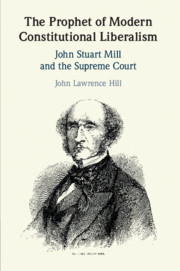Book contents
- The Prophet of Modern Constitutional Liberalism
- The Prophet of Modern Constitutional Liberalism
- Copyright page
- Dedication
- Contents
- Introduction
- Part I Mill and His Place in the Liberal Tradition
- Part II Mill and the Constitution
- 4 Constitutional Liberties before Mill
- 5 The Intellectual Origins of the Right to Privacy
- 6 Mill and Modern Freedom of Expression
- 7 A New Equality
- Index
7 - A New Equality
from Part II - Mill and the Constitution
Published online by Cambridge University Press: 02 April 2020
- The Prophet of Modern Constitutional Liberalism
- The Prophet of Modern Constitutional Liberalism
- Copyright page
- Dedication
- Contents
- Introduction
- Part I Mill and His Place in the Liberal Tradition
- Part II Mill and the Constitution
- 4 Constitutional Liberties before Mill
- 5 The Intellectual Origins of the Right to Privacy
- 6 Mill and Modern Freedom of Expression
- 7 A New Equality
- Index
Summary
John Stuart Mill is remembered today primarily for his views on freedom both in its negative form (privacy) and in its affirmative form (self-expression). But there is a third important aspect of his thought for which he is, unjustly, seldom remembered at all. Mill was a true egalitarian – and in the modern sense of that word “equality.” It was Mill who began to harmonize liberty and equality in a way that led to the modern progressive synthesis of the two values. It was Mill, moreover, who was an impassioned critic of slavery, racism and gender discrimination – at a time when these views were neither popular (even among the intelligentsia) nor considered part of the panoply of “liberal” positions. It was Mill who began to make equality an integral part of liberalism rather than a value in tension with liberty, as classical liberals had seen it.
- Type
- Chapter
- Information
- The Prophet of Modern Constitutional LiberalismJohn Stuart Mill and the Supreme Court, pp. 120 - 136Publisher: Cambridge University PressPrint publication year: 2020

